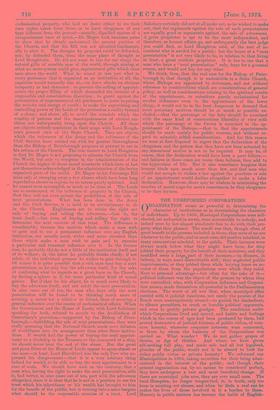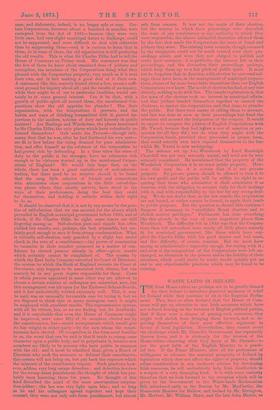THE UNREFORMED CORPORATIONS.
ORGANISATION seems as powerful in determining the character of institutions as in determining the character of individuals. Up to 1835, Municipal Corporations were self-
elected, sat and acted in secret, were accountable to nobody, and indeed were by law almost absolutely free to do with their pro- perty what they pleased. The result was that, though often of great benefit to the persons included in them, they were of no use whatever to the public, and in most cases did positive mischief, in many cases serious mischief, to the public. Their incomes were always much below what they might have been, for they jobbed their property for the benefit of their members, and they muddled away a large.part of their incomes,—in dinners, in bribery, in ways more discreditable still; they neglected public improvements, or they jobbed them while levying taxes on ac- count of them from the populations over which they ruled. Next to personal advantage—but often for the sake of A- political influence was the object of the persons by whom they were controlled, who, with Corporation influence and Corpora- tion money, made themselves all-powerful in the Parliamentary elections.. The worst of all was that, when municipal office carried with it judicial functions, not rarely the powers of the Bench were unscrupulously abused—to punish the disobedient, to silence grumblers, to crush or humble political opponents, and even to gratify private grudges. The conditions under which Corporations lived and moved, and habits and feelings which in the course of ages had been produced by them, had proved destructive of judicial fairness, of public virtue, of com- mon honesty, wherever corporate interests were concerned, in those by whom the business of the Corporations was carried on. What wonder We do not gather grapes of thorns, or figs of thistles. And where we have given self-seeking full play, and made safe and all but legalised, plunder of the public, would not it be absurd to look for either public virtue or private honesty ? We reformed our Municipalities in 1835, taking securities for their being admi- nistered in the interest of the public ; and though their present organisation can by no means be considered perfect, they have undergone a vast and most beneficial change. If there are municipal jobs now, they are very small ones. The local Hampden, no longer tongue-tied, is, in truth, only too keen in scenting out abuses, and when he finds a real one he makes the lives of those involved in it a burden to them. Honesty in public matters has become the habit of English- men, and dishonesty, indeed, is no longer safe or easy. Cer- tain Corporations, however, about a hundred in number, were exempted from the Act of 1835—because they were very little ones, had very slight municipal duties to discharge, could not be suppressed, and were difficult to deal with otherwise than by suppressing them—and it is curious to learn that in them, or in some of them, the old organisation is still producing the old results. This is what Sir Charles Dilke had to tell the House of Commons on Friday week. His statement was that the few of them he knew about remained dens of jobbery and corruption, the members of the Corporations doing what they pleased with the Corporation property, very much as if it were their own, and in fact making a good deal of it their own. A statement like this, scarcely denied about a few, seems a suffi- cient ground for inquiry about all ; and the results of an inquiry, while they might be of use to particular localities, would cer- tainly be of some general interest. Can it be that, with a growth of public spirit all around them, the unreformed Cor- porations show the old appetite for plunder? Has their organisation, with the temptations it presents, and the habits and ways of thinking transmitted with it, proved im- pervious to the modern notions of duty and honesty in public matters? Are Hastings and Winchelsea, the places mentioned by Sir Charles Dilke, the only places which have voluntarily re- formed themselves? Galt made his Provost—though only, canny Scot that he was, after he had feathered his own nest— see fit to bow before the rising demand for pure administra- tion, and offer himself as the reformer of the corporation he had grown rich by defrauding. In a time when the sense of duty to the public is far stronger, have no reformers rich enough to be virtuous started up in the unreformed Corpor- ations of England? We would fain hope that, on the whole, there has been a great curtailment of mal-adminis- tration, but there need be no surprise should it be found that the snug little coteries of friends and connections who administer close corporations in the little out-of-the- way places where they mostly survive, have stood in the ways of their predecessors, doing the best they could for themselves, and holding it entirely within their right to do so.
It should be observed that it is not by any means by the prac- tice of self-election that we can account for the abuses which prevailed in English municipal government before 1835, and of which, if Sir Charles Dilke be right, some traces are still lingering among us. Self-election pure and simple has often yielded fair results, not, perhaps, the best attainable, but cer- tainly good enough to save it from strong condemnation. What is virtually self-election, only guarded by a slight but useful check in the veto of a constituency—the power of nomination to vacancies in their number possessed as a matter of con- fidence by elected persons already in office—gives results which certainly cannot be complained of. The system by which the East India Company recruited its Court of Directors, the system by which the Bank of England recruits its Court of Governors, may happen to be associated with abuses, but can scarcely be in any great degree responsible for them. Cases in which persons appointed in some other way are allowed to choose a certain number of colleagues are somewhat new, but this arrangement was hit upon for the Endowed School-Boards, and it has undoubtedly worked extremely well. This, it may be said, was an unusually favourable case for trying it, but we are disposed to think that in many analogous cases it might be employed with excellent results. The representative system, with all its virtues, has, as we are finding out, its drawbacks. and it is conceivable that even the House of Commons might be improved, were some fifty of its members elected not by the constituencies, but—under arrangements which would give its fair weight to either party—by the men whom the consti- tuencies have elected. Of co-optation in the form most familiar to us, the worst that can be said is that it tends to stamp some character upon a public body, and to perpetuate it, because new members are likely to be persons who have points in comnion with the old ; and it must be admitted that, given a Board of Directors who cook the accounts or defraud their constituents, this system will not bring on, but put back the exposure which the interests of the constituency require. Such practices, how- ever, seldom very long escape detection ; and detection involves for the wrong-doers punishment, the thought of which has pro- bably been haunting them for years. No thought of this kind disturbed the mind of the most unscrupulous corpora- tion-jobber; the law was very light upon him ; and so long as he and his colleagues agreed together and kept their counsel, they were not only safe from punishment, but almost
safe from censure. It was not the mode of their election, but the secrecy in which their proceedings were shrouded, the want of any constituency or any authority to which they were responsible, the almost unlimited discretion allowed them by the law, that made the Corporations the nests of fraud and jobbery they were. The existing town councils, though returned by the ratepayers, could not be much trusted were their pro- ceedings secret, and were they not obliged to publish and verify their accounts ; it is publicity, the interest felt in their proceedings, and the discussion their proceedings undergo, which keep them up to a fair pitch of public spirit. It must not be forgotten that in America, with election by universal suf- rage, there have been, in the management of municipal corpora- tions, abuses of far more formidable dimensions than our English Corporations ever knew. The mode of election has had, at any rate directly, nothing to do with this. The simple explanation is, that the mass of the electors took no interest in municipal affairs, and that jobbers banded themselves together to control the elections, to master the corporations, and that done, to plunder the public. But there were means of calling them to account, and this was done as soon as their proceedings had fixed the attention and aroused the indignation of the country. It would be unjust to compare the jobbers of English Corporations with Mr. Tweed, because they had inilaw a sort of sanction or per- mission for all they did ; but do what they might with the Corporation funds, provided they proceeded in proper form, they could scarcely ever have exposed themselves to the fate which Mr. Tweed is now undergoing.
The defence set up for; Woodstock by Lord Randolph Churchill was not very seriously meant, and need not be very seriously considered. He maintained that the property of the Woodstock Corporation is in no sense public property. How- ever this may be, it is certain that it is not private property. No private person should be allowed to turn it to his own profit, and the public will be within its right in re- quiring that those who administer it shall administer it as trustees, with the obligation to account fully for their dealings with it, and with responsibility to the law for any wrong-deal- ing. We do not doubt that, as the law stands, the corporation are not bound, or rather cannot be forced, to apply their funds to public purposes. But the question is, should this continue Suppose it necessary to "annihilate Royal charters and to abolish ancient privileges." Parliament has done something like this already in the case of more important places than Woodstock. The difficulty felt in 1835 was that the Corpora- tions then left untouched were nearly all little places scarcely fit for municipal government, like those which have sup- plied Sir Charles Dilke with his good stories and bad cases, and this difficulty, of course, remains. But we must have among us administrative ingenuity enough for coping with it ; and even if the composition of the Corporations were left un- changed, an alteration in the powers and in the liability of their members, which could easily be made, would quickly put an end to any objectionable practices which may be found to be existing.



































 Previous page
Previous page